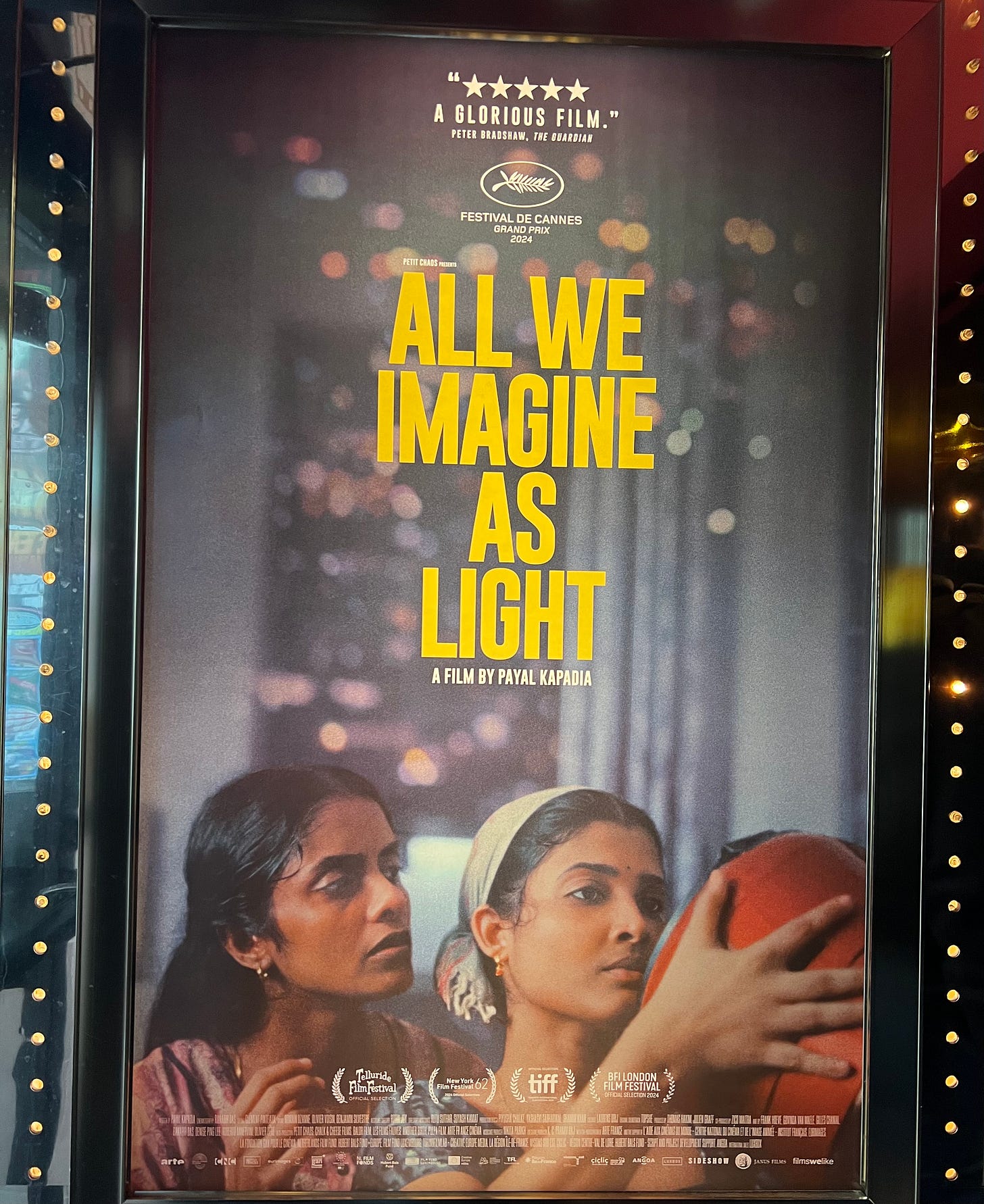Desire is An Action-Oriented Word (Reflections On All We Imagine As Light)
Reflections from an incredible film and my favourite books from an extraordinary reading year.
Coming out of Payal Kapadia’s stunning film All We Imagine As Light it is difficult to go home directly. Despite jotting reflections in the dark theatre during the film, I need movement, walking, a coffee shop and time to journal and process this gorgeous film fully. This film revolves around three women, but is mostly about one woman Prabha, the head nurse in a Mumbai hospital. When we meet her she is in her late thirties to early forties perhaps, and she is married, but her husband lives in Germany and she has not heard from him in more than a year.
Her roommate is Anu, a younger female nurse at the same hospital, who we first see at the hospital admission desk giving birth control pills to a 25 year old woman of three kids to help her have some agency over the next time she has a child. We later find out that Anu has a Muslim boyfriend that her family would not approve of and despite trying to be discreet, her colleagues gossip about her and her seemingly inappropriate behaviour.
The third character is Parvaty, an older woman who works as a cook at the hospital, is a widow and is being bullied by builders to vacate her apartment of 22 years. We follow these women and this city in their journey to and from work by train (usually when it’s raining heavily) and in the brief spots of time when they are not commuting or working but living their lives, cooking fish, sitting in roadside cafes, fighting for justice, looking for privacy to be in relationship. For Anu in particular, there is nowhere for her to be with her partner.
We see a lot of Mumbai in this film, the colours, the sounds, the languages, the crowds, the daily struggles and we see how difficult life is and how we all need each other to make it through. To survive poverty, patriarchy, the policing of women, capitalism, neo-liberalism - we can only heal and resist and survive these things through friendship and community. Each of these women have families that are too far away to be useful and so they rely on each other. We see Prabha encouraging Parvaty to see a lawyer when she loses courage to keep fighting her housing battles, we see her accompanying Parvaty to appointments and them spending hours together after work to search for paperwork that might establish legitimate tenancy. That search for paperwork is in a cramped space, in pouring rain (a theme through the film) and without electricity because the electricity in Parvaty’s apartment has been cut as a bullying tactic. Eventually, Anu and Prabha help Parvaty move. The care is multi-directional - Parvaty gives Prabha solace and advice about her non-existent marriage and expresses rage on behalf of her friend. Prabha helps Anu out financially. Anu helps Prabha navigate a strange arrival one day of a rice cooker from Germany with no return address.
Seeing them reminded me of a podcast I am in the middle of listening to right now (it’s 2 hours long) about prefigurative politics, defined as trying to implement the world we want to live in now, and organizing in the here and now in a way that reflects that world and allows us to practise being in it. The podcast spoke about how to create a beautiful just and kind world, we need our activism to be beautiful just and kind as well and we see that here. In this film, we see these women care for each other. We witness beauty, laughter and joy in their organizing, whether it is attending union meetings to organize for the right to housing or throwing rocks at a sign that celebrates and defends class stratification.
More than anything though, this is a film about female desire in the broadest “having agency to make things happen” sense of the word. Parvaty cannot stay in her home so she has to make a plan to survive. Anu cannot find a place to be with her boyfriend so she has to make a plan before her family plans for her. And Prabha, played by Kani Kusruti is magnetic. She is powerful and competent at work - she can scold junior nurses, teach, advise, save lives, but she cannot change the conditions of her life. She does not have contact details for her husband, but she is still married and so she cannot move forward with her life. A doctor at the hospital waits for her each day to head to the train, writes her poetry, brings her snacks and shares his language struggles of going from Malayalam to Hindi but she cannot reciprocate any of his actions. She reads his poetry by the light of her phone the same day she receives the bewildering rice cooker, she is irritated to see anyone else near him but she is stuck in a bond not of her choosing.


